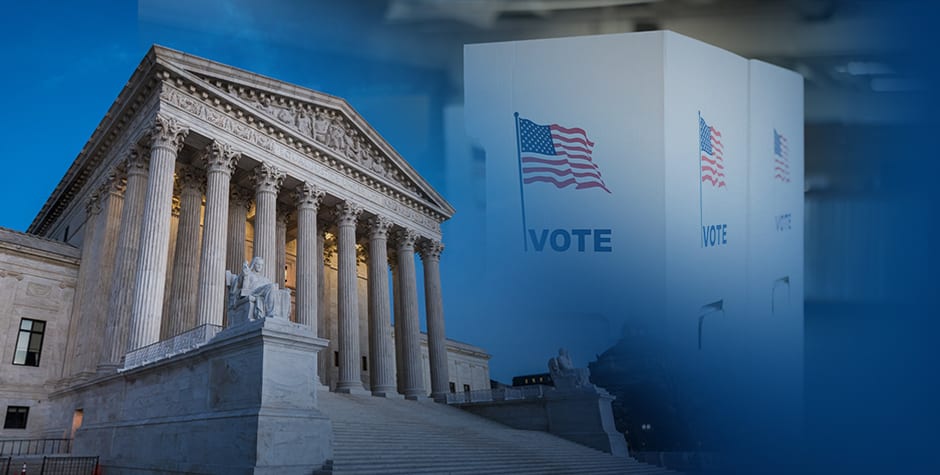BREAKING: ACLJ Wins Major Victory at the U.S. Supreme Court, Defending Your Right To Vote in Trump v. Anderson
We just won one of the most important U.S. Supreme Court election cases in American history. The ACLJ represented the Colorado Republican Party in reversing the Colorado Supreme Court’s removal of President Trump from the state’s primary ballot. Only a day before Super Tuesday, in a historic and unanimous decision, the Court ruled that Colorado violated the Constitution, as only Congress has the authority to enforce the 14th Amendment. In litigation that took just six months, we won a victory at the highest Court in the land, defending your right to vote across the country.
The Supreme Court’s decision restores the right to determine who should serve as the President to the people – where it belongs. The Court’s ruling ensures that politicized, arbitrary interpretations of insurrection cannot be used by bureaucrats and Secretaries of State to decide for themselves who should be allowed to govern. The people, not the courts, will decide the next President of the United States.
The stakes were high in this case that challenged our Constitution, our system of elections, and the voters’ right to choose their candidates. By overturning the Colorado Supreme Court, the U.S. Supreme Court has prevented these radical attacks on the political process from using Section 3 of the 14th Amendment to block people from being able to vote for the candidate of their choice. We are encouraged by the fact that this decision did not rely on partisan affiliation. All nine Justices recognized the dangers of what the Colorado Supreme Court did in this case. As even Justices Sotomayor, Kagan, and Jackson concluded: “To allow Colorado to take a presidential candidate off the ballot under Section 3 would imperil the Framers’ vision of ‘a Federal Government directly responsible to the people.’”
The Supreme Court’s unanimous decision reflects the arguments we advanced, explaining why states lack the authority to enforce Section 3. As we explained back in September:
The cited provision of the 14th Amendment does not give a Secretary of State, or anyone else, the authority to unilaterally decide to remove someone from the ballot. If it did, it would allow for the arbitrary removal of any candidate without due process, without trial, and perhaps with a simple declaration by the Colorado Secretary of State or some other Secretary of State that the candidate is ineligible. Instead, the 14th Amendment operates “by the legislation of congress in its ordinary course,” as Chief Justice Chase explained when the provision was first ratified. Without a federal law giving them the right to seek a candidate’s removal, there is no basis to try to remove President Trump from the ballot in Colorado or anywhere else.
Today in Trump v. Anderson, the Supreme Court unanimously recognized the same truth that “the Constitution makes Congress, rather than the States, responsible for enforcing Section 3 against federal officeholders and candidates.”
The Court’s ruling that “[s]tates have no power under the Constitution to enforce Section 3 with respect to federal offices, especially the Presidency,” is a direct echo of the arguments we have made in this case. As we stated in our briefs to the Court: “Congress, and only Congress, has authority to enforce Section Three. . . . [S]tates cannot claim for themselves authority to seek the disqualification of presidential candidates absent congressional authorization.”
The Court further explained that “the notion that the Constitution grants the States freer rein than Congress to decide how Section 3 should be enforced with respect to federal offices is simply implausible.” Id. at 11. In fact, “[t]he Constitution empowers Congress to prescribe how those determinations should be made. The relevant provision is Section 5, which enables Congress, subject of course to judicial review, to pass ‘appropriate legislation’ to ‘enforce’ the Fourteenth Amendment.” Id. at 5.
The Court conclusively recognized the purpose of the 14th Amendment: “It was designed to help ensure an enduring Union by preventing former Confederates from returning to power in the aftermath of the Civil War.” Id. at 4. Thus, the Court curtailed Colorado’s attempt to misuse the Constitution to serve its own political purpose.
This is one of the most important constitutional victories the ACLJ has ever achieved. The repercussions of the Court’s decision will be felt across the country in the other cases trying to remove President Trump from the ballot. In particular, the decision of the Maine Secretary of State to keep President Trump off the ballot should be overturned as a result of today’s victory.
The Left should never be allowed to twist the law in the partisan fashion it did here. No Secretary of State should feel emboldened to remove candidates from the ballot in such a politicized fashion. The Supreme Court’s momentous decision should be a clear warning to all states to stop seizing from the people their right to select the next President. The ACLJ will keep you updated as we continue fighting for your right to vote by getting these other cases thrown out.
